QuestionQUESTION: Hi,
I have a nearly 9 year old lionhead doe. About 2 months ago, we went away for a week, leaving her with a trusted rabbit kennels, where we've left her before with no problems, where she would get her normal diet and plenty of exercise. She seemed fine immediately we brought her back, but soon began to exhibit symptoms that something was wrong. She seemed unhappy and her appetite dropped. She then developed runny caecotropes and was making a snuffly growling sound. She had a mild nasal discharge. My vet prescribed Baytril and fenbendazole, and I syringe fed her until she started to feed herself again. Since she had gas, I also gave her simeticone. All was fine, her gut function returned to normal and she was starting to pick up again, when a couple of weeks ago she developed loose stool and stopped eating completely. I rushed her back to the vet, who said her teeth were overgrown at the back, and these were clipped. She was also put back on Baytril. A week later, I took her back. This time she was given kaolin and a prebiotic for her stomach. It has not improved her in the slightest.She is now eating, but doesn't appear to be gaining weight. She's still making the growly snuffly noise, but I'm not convinced it's a nasal blockage, as she has no nasal discharge whatsoever. I think it's a response to discomfort. My question is this. Despite seeing no worms in her faeces, could this be a case of intestinal parasites? Or possibly coccidiosis? I've put her back on the wormer she had initially but I'm wondering if there's anything else I can do, or anything I should be asking my vet to do. Also, if it is parasites, and she has become reinfected, it suggests that my hutch disinfectant didn't kill the eggs. How can I clean the hutch to make sure no eggs remain, while leaving it safe for my bun?
ANSWER: Hi Ruth,
My first thought is intestinal parasites. I would like to know if the vet did a full fecal? Why was she given Baytril and how was it administered? How was the Fenbendzole dosed as far as timing between dosing. Kaolin? PRE? biotic???? What exactly is her diet? Brands, amounts etc.
Pending receiving that info from you, here are some thoughts on some of the individual components of your question.
As far as seeing worms in her feces, that isn't going to happen. Even with a fecal float, unless the spores are shedding the fecal will be negative. Fenbendazole (Panacur) will control most worms. Most vets dose three rounds...I dose four rounds seven days apart. A look at a fecal pellet under a microscope can easily show coccidia....little "fried eggs". Most vets use Sulfanomides with coccidia....I tend to use a drug called Marquis (Ponazuril). It is an anti-protozoal used to treat EPM in horses. I have been running test protocols with Marquis against another protozoan infection known as E Cuniculi. It is a bit hard to get and is very expensive as sold. In reality, while these drugs can help against coccidia, it is the immune system that can control it.
I am concerned about using Baytril. Why? Baytril was once a "wonder drug" but has been so misused over the years that all but the weakest of bacteria are becoming resistant. I have not used Baytril in years and most of the exotic focus vets I know have also abandoned it. It was more effective when injected as a sub-q administration. Given orally, it can seriously alter the bacterial flora in the gut and easily cause GI upset. Unfortunately, it is still being used because it is "safe"...but we use much more effective antibiotics now that are "safe". No flaming to your vet intended. Baytril is much like penicillin in human medicine....it was used in inappropriate situations when there was no clinical evidence of a bacteria infections existed....or that the bacteria was totally sensitive to the particular drug...that the bacteria mutated and became resistant....which means the drug doesn't work any longer against that particular bacteria. That is why it's important to use antibiotics correctly....against comfirmed sensitive bacteria and in the correct dosing protocol.
Were you giving a "PRE"biotic? I do not use prebiotics and I do not use anti-diarhheal medications. The proper climate in the digestive system is an acidic pH. Many of the anti-diarhheal medications contain an antacid....and to get a "ready gut"....you need more acid. That is where a PRObiotic comes in. I use probiotics quite a bit with sick domestic rabbits....and I use it to manipulate the pH in weaning wild rabbits (I primarily do wildlife). The product I use most often is called Bene-Bac. It contains huge amounts of L Casei and Enterococcus which is essential in building a good climate for beneficial bacterial growth in the digestive system..particularly the cecum.
I would also suggest making sure you are feeding a basic rabbit diet. Low protein/high fiber. In the case on ongoing GI upsets, this is much more important. The primary diet of an adult rabbit should be unlimited grass hay....timothy, orchard grass, brome, oat, bermuda, etc. and various cuts of each. This provides bulk in the diet that controls GI transit time..if the transit time is too fast, you get an upset gut....if it's too slow, you get stasis/ileus. Not good either way. I am concerned that maybe she isn't getting enough hay since you had to have the molars trimmed. Strand hay is the primary way to keep those teeth the correct length. Feed very limited high quality pellets....we feed pellets only to maintain weight and body conditioning. Our healthy small rabbits (usually around 2 pounds) get no more than 1/8 cup pellets per day....our large Flemish Giants (around 30 pounds) get about 1/3 cup pellets per day. Rabbits were designed to eat veey low protein food (look at wild rabbits....their guts are identical to domestics). Hay is nothing more than dried grass.
I would suggest having a full fecal float (more than one actually over a period of several weeks) and I would do a full blood chemistry with an EC titer.
I'll be watching for your response to my opening questions.
---------- FOLLOW-UP ----------
QUESTION: Hi,
No the vet hasn't done a faecal exam, and I shall be asking them to do this at her next appointment. She was given Baytril because of nasal discharge- they suspected snuffles. The prebiotic is Pro-Kolin - a prebiotic and probiotic supplement with kaolin paste. Again, the vet prescribed it to counter the effects of the baytril and to ease her diarrhoea, which it didn't seem to be doing. Her diet USED to be as follows (pre-illness):
Unlimited grass hay
Small amount of pellets (3 tbsp or so ) once a day
Small amount of veg (ie half a small carrot) twice a day.
I suspect her molars overgrew because she became anorexic at the beginning of the illness and I had to syringe feed her with a critical care mix. Now, post-illness she's got unlimited grass hay (mainly timothy) but she's not really eating a lot of it. She's eating SOME hay and a few pellets and a little bit of veg, but nothing like she used to, although she eats her bedding straw (some of it anyway- the rest she bites in half to make her bed softer). She used to go through a couple of rackfuls of hay a day and now she's down to about an eighth of that. Her pellets are Burgess Supa Rabbit Excel by the way, as if I give her a mixed dry food she's a selective feeder.
I hope this is enough information. I shall ask my vet to examine her faeces and do a blood test.
Thankyou for your help.
ANSWER: Hi Ruth,
From your latest response, I think you might would be prudent in greatly reducing the sugar content of the diet. We don't have the Pro-Kolin here in the US but I did a little research on that product. It's not something I would use in a rabbit. I have several concerns about this product in rabbits but it contains pectin which is a complex carbohydrate....sugar. That product is made for dogs and cats....and the dynamics of a rabbit gut is much different than that of a dog or cat. In your vet's defense, it still seems that much of the training and information they haved access to comes from a time when it was thought a rabbit and a cat should be treated identically. Carrots are also not healthy as anything other than a treat....I was shocked to find out how much sugar is in carrots. I would really suggest an appropriate PRObiotic. Here in the US, I use Bene-Bac. It contains L Casei and Enterococcus strains of bacteria. I would suggest finding a similar product.....and I know there is one....that is available in the UK (I am assuming you are in the UK by the Pro-Kolin). If all else fails, non-dairy Lactobacillus Acidophilis is an acceptable alternative. The idea is to acidify the gut. The proper pH in a healthy rabbit is 1-2.
The Snuffles/Baytril things scares me. There is no such thing as "snuffles". This is a very broad term that comes from a time in which there was no clinical information at all about rabbits. It is a convenient way to place blame if something goes wrong. It appears that it originally meant an upper respiratory infection but came to mean just about any infection. The most common pathogen found in upper respiratory infections is Pasteurella Multocida. Since many vets "try" antibioticss (same as many people doctors) Pasteurella is becoming resistant. Baytril is pretty much losing it's effectiveness against this pathogen and as I mentioned in my previous response, I don't use Baytril in rabbits and haven't for a long time. Most of the upper level exotics vets in the US have moved away or they are in the process of discontinuing the use of Baytril. If this is a Pasteurella concern, the drug of choice is Zithromax. I also use Chloramphenicol and Pen G (this specific version I use is not available in the UK). I have also recently started using Convenia which has just been approved for dog/cat use in the US.
I did some research on the pellets you are using. I think they are a little low in fiber but other than that, I would use them with no problem. The protein level is fantastic for pellets.
Here are my suggestions for discussion with your vet.
>Drop the Pro-Kolin. Find a probiotic with the strains of bacteria I mentioned or the non-dairy LA.
>Drop the Baytril. Culture the discharge to see exactly what the pathogen is and what it is sensitive to. If it's pasteurella, I would most likely go with the Zithromax. It has to be doses at a much higher dosage than with dogs and cats. Baytril itself can cause the problems your rabbit is experiencing. I really prefer to use injectable drugs since they tend to have less effect on the GI especially with antibiotics. Injectables also allow a much larger window of treatments since we can use injectable versions of drugs that would be dangerous if given orally.
>Since there is some issues with the molars, discharge from the nose and loss of appetite, I would sedate your bun and do a thorough exam on the teeth including radiology to look for soft tissue issues or molar root impactions. There is a possibility of a dental issue causing this problem.
>Perform a fecal float and look specifically for coccidia. Fecals are notoriously inaccurate for worms so we treat for worms regardless.
>Offer a buffet of hay....including alfalfa
>Limit the carrots. But do offer high calorie food like kale, dandelion greens and carrot tops (in moderation of course)
>I would use a pain med to see if it improved her sitation. If an NSAID is used, limit the dosing to four days. I do use Buprenorphine (Buprenex) and Tramdol (many vets are not aware of the benefits of Tramadol in a rabbit). If her problems are caused by a dental problem, some pain meds may improve her appetite and that would be a "marker" as to the root cause of the concern.
>I use an injection of B Comp to help stimulate the appetite. We use this in sick domestic animals and nearly all incoming wildlife.
---------- FOLLOW-UP ----------
QUESTION: Thank you so much for all of this. Just a couple of follow-up questions- when you said 4 courses of panacur each a week apart are you referring to 4 full 9-day courses and should I do this with her (she's currently 2 days into the 2nd course)?
Also what kills parasite eggs or coccidia oocytes? Is there a bun-safe disinfectant or is good old elbow grease and very hot water the best thing?
She's off the baytril now and I'll drop the pro-kolin as of today and get the probiotic you recommended.
I'll ask about a possible dental problem. They did deal with her molars under generall anaesthetic so I'd hope they would have noticed anything then but you never know!
I have had her for nearly 9 years now and this is the first time she's been sick. Thankyou for your pointers. I hope I can get her all fixed up now.
And yes, I'm in the UK!
Once again, thanks for everything.
AnswerHi Ruth,
You should be fine with your deworming protocol. There are different ways to do it but the main thing is to attempt to cover reproductive cycles of the worms. If you don't know the exact worm you are dealing with, you treat by the "SWAG" method. Panacur is usually well received by rabbits and I have dosed it for 60 consecutive days with no major issues.
I think most people use hot water, bleach and elbow grease to disinfect. If you know of anyone in human medicine....there are some very good products available (at least in the US) that can control coccidia in the environment.
As far as the dental possibility....if the problem is an abscessing root, that would most likely not be visible by looking. This problem would be inside the jaw. In many cases a soft tissue problem (abscess) can be seen on conventional x-rays but MRI is better if it's available there.
I'm impressed with her age. Obviously she is in a good home. Keep me posted.

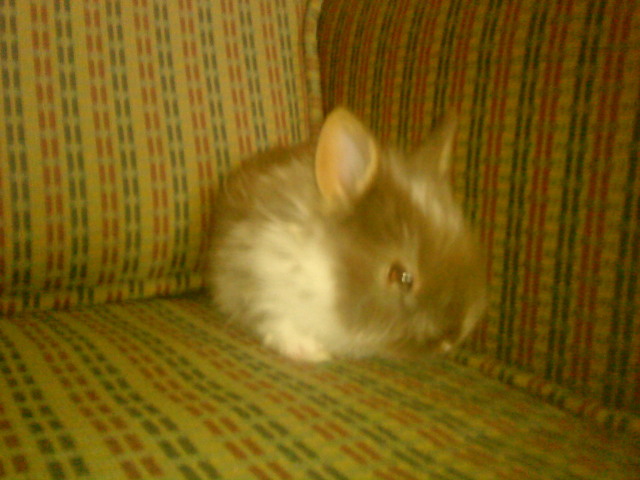 breed and age of my bunny
Question
thumper
Hi how are you sorry for the bother bu
breed and age of my bunny
Question
thumper
Hi how are you sorry for the bother bu
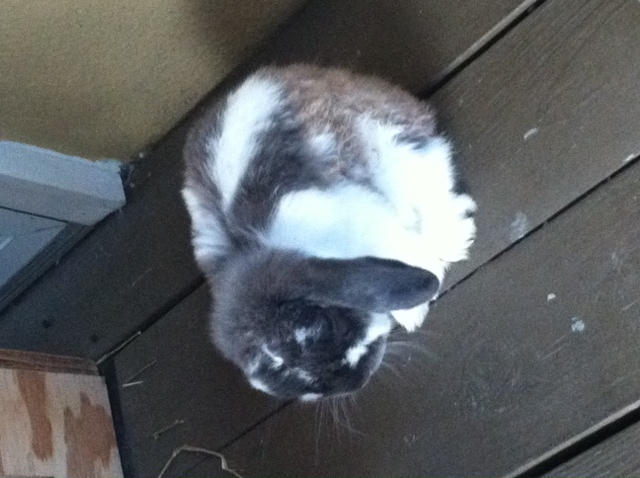 Scab-ish growth on my rabbits ear?
Question
Rhino Right outer ear
Hello!
Ill
Scab-ish growth on my rabbits ear?
Question
Rhino Right outer ear
Hello!
Ill
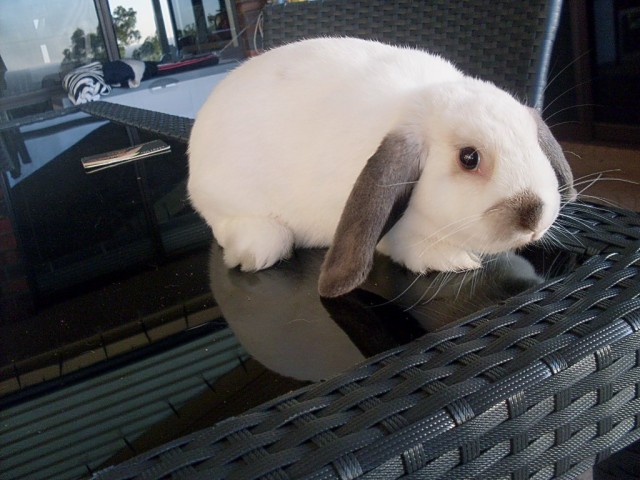 bunny bipolar
Question
blossom
hey! im elizebeth and im 18..
my dwarf
bunny bipolar
Question
blossom
hey! im elizebeth and im 18..
my dwarf
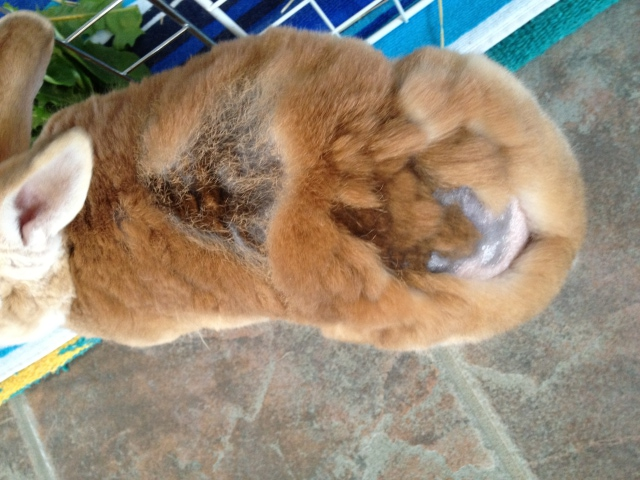 Fungal Infection
Question
Fungal Infection
Dear Dr. Krempels,
I
Fungal Infection
Question
Fungal Infection
Dear Dr. Krempels,
I
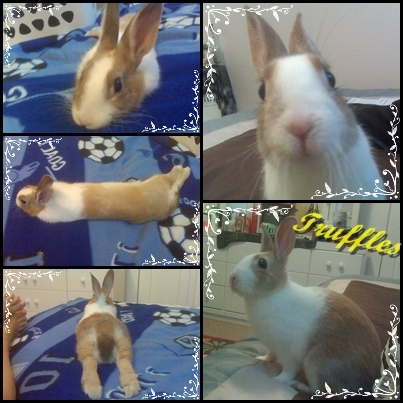 sick bunny- pasteurella?
Question
Truffles
Hey There Dana,
sick bunny- pasteurella?
Question
Truffles
Hey There Dana,